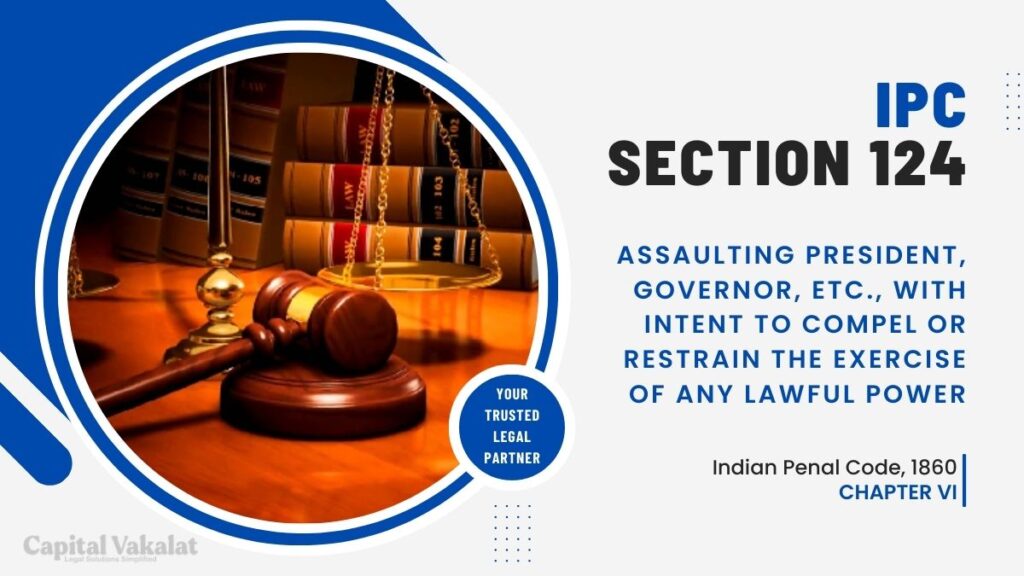In the vast framework of Indian Penal Code, Section 124 stands as a provision of paramount importance, one that deals with offenses against the highest constitutional authorities of the country – the President, Governors, and other high-ranking officials.

This article delves into the intricacies of Section 124 IPC, which pertains to “Assaulting the President, Governor, etc., with intent to compel or restrain the exercise of any lawful power.”
Understanding Section 124 IPC
Assaulting the President, Governor, etc.
Section 124 IPC is primarily concerned with acts aimed at assaulting or endangering the safety of the President, Governor, or other high-ranking officials. It is important to note that these offenses are not just limited to physical assault but can also encompass actions that put these authorities at risk.
Intent to Compel or Restrain
To qualify as an offense under this section, there must be a specific intent – the intent to compel or restrain the exercise of any lawful power. This intent distinguishes mere assault from a more serious criminal act under the law.
Exercise of Any Lawful Power
The targeted intent here is to obstruct or force these authorities to act or refrain from acting within the bounds of their lawful powers. This is a critical element of the offense.
Historical Context
The origin of Section 124 IPC can be traced back to the colonial era. The British rulers of India introduced this provision as a means to safeguard their administrators from harm. However, post-independence, the section continues to be an integral part of Indian law.
Relevant Legal Provisions
To better comprehend Section 124 IPC, it’s essential to consider the related legal provisions. For instance, Section 125 IPC deals with “waging war against any Asiatic Power in alliance with the Government of India.” It adds depth to the legal framework concerning national security.
Notable Cases
Over the years, there have been several notable cases under Section 124 IPC, involving individuals who have targeted high-ranking officials. These cases provide insights into the legal interpretations and implications of the section.
Defenses
It’s important to understand the defenses available to those accused under Section 124 IPC. An exploration of legal defenses such as lack of intent or mental incapacity is vital.
Penalties and Consequences
The consequences of being found guilty under this section can be severe, with imprisonment being one of the primary penalties. The article delves into the possible legal ramifications.
Significance of Section 124 IPC
This section holds significant importance in the Indian legal system as it directly concerns the security and functioning of the highest authorities in the country. Understanding its significance is key to comprehending the broader legal landscape.
Challenges and Controversies
Like many legal provisions, Section 124 IPC is not without its share of controversies and challenges. This section explores the contentious issues and debates surrounding its application.
International Perspective
How do other nations deal with offenses against their highest officials? A comparative analysis with international laws and practices sheds light on the global perspective.
Recent Developments
The article also covers any recent developments or amendments to Section 124 IPC, ensuring the reader is up-to-date with the current legal scenario.
The Need for Amendment
With the changing socio-political landscape, there’s a growing need to assess the relevance and adequacy of Section 124 IPC. This section discusses the need for potential amendments to the law.
Conclusion
In conclusion, Section 124 IPC plays a crucial role in upholding the integrity and security of high-ranking officials in India. Understanding its nuances, consequences, and historical significance is essential for both legal professionals and the general public.
FAQs
Can non-violent actions be considered offenses under this section?
Yes, non-violent actions, if they have the intent to compel or restrain the exercise of lawful powers, can still be considered offenses under Section 124 IPC. It’s the intent that matters.
Are there any precedents of notable cases under Section 124 IPC?
Yes, there have been several notable cases where individuals have been accused and prosecuted under Section 124 IPC. These cases often involve actions that posed a threat to high-ranking officials.
What defenses are available for individuals accused under this section?
Defenses can include lack of intent, mental incapacity, or proving that the accused’s actions didn’t meet the criteria specified in Section 124 IPC. Consultation with a legal expert is crucial to understanding specific defense options.
Is there a need for reform or amendment in Section 124 IPC?
Yes, considering the evolving socio-political landscape, there is a growing need to assess and potentially amend Section 124 IPC to ensure it remains relevant and effective in addressing contemporary challenges.